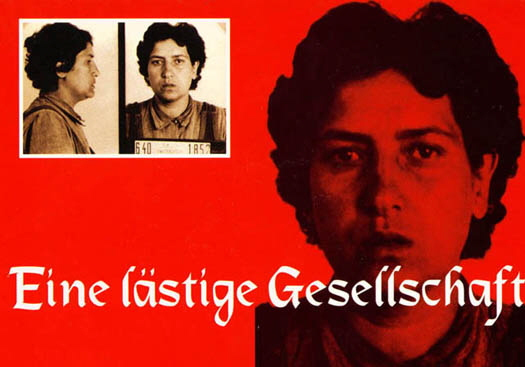SWITZERLAND IS NOT AN ISLAND - from March 5th at Shedhalle
Shedhalle / Exhibitions / SWITZERLAND IS NOT AN ISLAND

„An undesirable society“, Marika Schmiedt
SWITZERLAND IS NOT AN ISLAND - from March 5th at Shedhalle
Shedhalle will carry out an annual program of exhibitions, films and events, entitled „SWITZERLAND IS NOT AN ISLAND“:
On the one hand side, the program will bring up the issue of social exclusion and persecution, but also political and cultural self-organisation of Jeni, Sinti and Roma in Switzerland aswell as in Europe. The regulation of public space through a ban of begging or other policies of spatial exclusion will be placed within the context of distribution and redistribution of wealth, the „making-invisible“ of poverty as well as possible counter-strategies. This will be linked to questions of political exile, border and migration policies.
The topic of political exile will be revisited in the other core theme of the program: within the framework of the „Richard Wagner Year“ 2013 it will adress the production of the artistic genius as a commercial and high brow cultural strategy of commodification and location policy. Different projects will query the transformation of an anti-Semite into a dazzling role model for Switzerland as „country of exile“ - while others, who are seeking shelter, a better life or simply their livelihood in Switzerland are being marginalized, criminalized and pushed out of public life and space.
The annual program will start with a film series of the same title: „SWITZERLAND IS NOT AN ISLAND“ in the beginning of March. It will take place twice a month in the newly designed Cinema at Shedhalle and is free of charge.
On April, 9th a „Research Exhibition“ will open at Shedhalle, which will engage with the mentioned two core themes. The exhibition assembles art works, publications and research material.The material will be the basis for Workshops, Discussions, poster campaigns or other interventions while the exhibition will be continuously supplied with documentation of the projects taking place.
For more information: leitung@shedhalle.ch
Film program 2013
curated by Peter Grabher
During the Wagner-Year 2013, the myth of the artistic genius flourishes, while Wagner´s exile in Zürich is being used as an opportunity to present Switzerland as a refuge for those who run for shelter. What stays blanked out is that Wagner developed his anti-Semitism in pamphlets like „Jewishness in Music“ (german: „Das Judenthum in der Musik“, 1850) here in Zürich, that Switzerland´s borders stayed closed for thousands of people during World War II and that the country is part of „Fortress Europe“ today. Like in most EU countries, swiss social and asylum policies marginalize and criminalize Jeni, Sinti and Roma, refugees, sans papiers and the poor – who in turn fight for their rights and self-determination.
The annual program of Shedhalle establishes the constellation /Wagner, Roma and Switzerland/ and points to what is going on today. The film series sheds light on how border and identity regimes can be challenged through other concepts of existential territory; how empowerment and filmic self-determination can leverage audiovisual, racist and biopolitical systems of exclusion; how the marginalized can intervene into the dominant order of history, history politics and politics of the presence; which positions beyond hegemonic violence could be seized by film makers and artists. In this way, the film series collects films that talk about historical and current exclusion in Switzerland; films that reveal history-political power relations; films that show the presence of Jeni, Sinti and Roma in (filmic) history and today but also problematize how they are made invisible; films which formulate selfdetermined image politics; films that make visible and audible the politics of music between the cult of the genius and ethnicizing/folklore.
Program March:
Program 1 / Tuesday, 5.3.2013, 18:30, Shedhalle
An undesirable society
in presence of director Marika Schmiedt
Filmic Empowerment: Marika Schmiedt „An undesirable society“ Marika Schmiedt, A 2001, 70 min
At the end of this film, we are left with images of Auschwitz under a cloudy grey sky. Director Marika Schmiedt wanders through the remnants of the place which stands emblematic for the national socialist murder machinerie. Her aunt Sophie survived Auschwitz, while grandmother Amalia Horvath was murdered in the course of the so called „Euthanasia“-program. „An undesirable society“ documents the persistent quest of the granddaughter in search of her grandmother. Her history-political research intervenes stubbornly and distorts the kafkaesque buerocracy of the archives.Those prove to be institutions of permanent exclusion, which are confronted by the film´s work of self-historization. Marika Schmiedt: „For me it is horrible and unbearable to see these connections to NS-history. (...) There are attacks, progroms, people getting killed. What else is necessary? Many people know about it, they are concerned for a short while but nothing changes“
Marika Schmiedt, born 1966 in Traun/Upper Austria, is an activist, film maker and visual artist. Dealing with the situation of Roma before and after 1945 constitutes a major focus point in her artistic work.
For more information on the film and about the artist´s work: http://www.marikaschmiedt.wordpress.com
Program 2 / Tuesday, 19.3.2013, 18:30, Shedhalle
Continuities of right-wing aestetics: Syberbergs Wagner/Hitler-Complex
a video-lecture by Peter Grabher
Both in the anti-Semitism of Richard Wagner as well as in his anti-modern art religion, the unappreciated artist Hitler found a congenial colleague and predecessor. Consistently, „fascism adds up to“ - according to Walter Benjamin – „a aestetization of politics“. Famously, Winifred Wagner dedicated Bayreuth completely to the Fuehrer and the NS-agitation film „The Eternal Jew“ (1940) quotes Wagner at a crucial point. Departing from this constellation, the video-lecture interrogates Hans-Jürgen Syberbergs filmic Hitler/Wagner-Complex, contextualizes it in the memorial epochal break of the 1970ies and presents different readings of his monstrous, anarchic and irrational montages – by Susan Sontag, Michel Foucault and Serge Daney but also on behalf of the
„New Right“. Film Clips: „Winifred Wagner and the History oft he house Wahnfried 1914–1975“ (D 1975), „Hitler, a film from Germany“ (D 1977-1980), „Parsifal“ (D 1982)
Peter Grabher, born 1969, historian and film scholar, teaches at a viennese college. 2006/07 research stay at the École normale supérieure, Paris. Works on his dissertation under the title »›here and elsewhere‹. Palestine-Israel in essay film«. Literature: »Sowjet-Projektionen. Die Filmarbeit der kommunistischen Organisationen in der Ersten Republik (1918-1933)«, in: Christian Dewald (Ed.), Arbeiterkino. Linke Filmkultur der Ersten Republik, Wien: Filmarchiv Austria 2007. Member oft he viennese group KINOKI (http://www.kinoki.at).

Post new comment